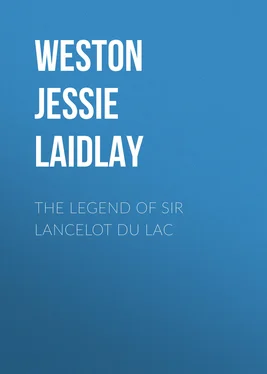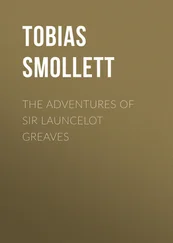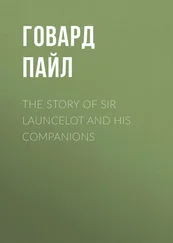Jessie Weston - The Legend of Sir Lancelot du Lac
Здесь есть возможность читать онлайн «Jessie Weston - The Legend of Sir Lancelot du Lac» — ознакомительный отрывок электронной книги совершенно бесплатно, а после прочтения отрывка купить полную версию. В некоторых случаях можно слушать аудио, скачать через торрент в формате fb2 и присутствует краткое содержание. Жанр: foreign_prose, foreign_antique, на английском языке. Описание произведения, (предисловие) а так же отзывы посетителей доступны на портале библиотеки ЛибКат.
- Название:The Legend of Sir Lancelot du Lac
- Автор:
- Жанр:
- Год:неизвестен
- ISBN:нет данных
- Рейтинг книги:5 / 5. Голосов: 1
-
Избранное:Добавить в избранное
- Отзывы:
-
Ваша оценка:
- 100
- 1
- 2
- 3
- 4
- 5
The Legend of Sir Lancelot du Lac: краткое содержание, описание и аннотация
Предлагаем к чтению аннотацию, описание, краткое содержание или предисловие (зависит от того, что написал сам автор книги «The Legend of Sir Lancelot du Lac»). Если вы не нашли необходимую информацию о книге — напишите в комментариях, мы постараемся отыскать её.
The Legend of Sir Lancelot du Lac — читать онлайн ознакомительный отрывок
Ниже представлен текст книги, разбитый по страницам. Система сохранения места последней прочитанной страницы, позволяет с удобством читать онлайн бесплатно книгу «The Legend of Sir Lancelot du Lac», без необходимости каждый раз заново искать на чём Вы остановились. Поставьте закладку, и сможете в любой момент перейти на страницу, на которой закончили чтение.
Интервал:
Закладка:
Jessie L. Weston
The Legend of Sir Lancelot du Lac / Studies upon its Origin, Development, and Position in the / Arthurian Romantic Cycle
PREFACE
The Studies contained in the following pages were, in the first instance, undertaken some four or five years ago. From time to time the exigencies of other literary work have compelled me to lay them aside, but the subject has never been lost sight of, and, not infrequently, studies in appearance wholly unconnected with the Lancelot legend have thrown an unexpected and welcome light on certain points of the story. Undertaken, in the first instance, with an absolutely open mind (even after I had been working at it for two or three years I should have been sorely at a loss if asked to state a theory of the origin of the story), it was only by slow degrees that the real bearing of the evidence became clear, and I felt that I had at last grasped a guiding thread through the perplexing maze. The results, which perhaps to some readers may appear startlingly subversive of opinions formally expressed by certain distinguished scholars, were wholly unforeseen. They are the outcome of genuine study of original texts; whether, in the long-run they be, or be not generally accepted, I would at least plead that they be judged on the evidence of those texts .
In certain cases I have little doubt as to the verdict. So far as the evidence concerning the sources of Malory, and the differing versions of the prose Lancelot , is concerned, the facts, now brought forward for the first time, are beyond dispute. They may, I hope they will, be hereafter added to, and confirmed. As they stand they encourage us to hope that further study of the material already available may yield welcome, and perhaps unsuspected results.
We are, so far, only on the threshold of a satisfactory and scientific criticism of the Arthurian cycle, and I doubt whether all who are engaged in this study recognise sufficiently either the extent and complexity of the questions involved, or the absolute futility of, at this early stage, enunciating dogmatic decisions on any of the various points at issue. Is there any one living scholar who is perfectly aware of all the evidence at our disposal for any of the great stories of the cycle? If there be, he will know, better than any other, that till critical editions place us in a position to determine the characteristic readings of the MSS. representing not one alone, but all those stories, their inter-relation, their points of contact with, and variance from each other, the very best work that can be done will be liable to bear the impress of a temporary character—it will not, it cannot be, final.
Elsewhere, I have urged that this fact be recognised and acted upon, and I cannot but hope that the evidence collected in these studies may help to convince others of the real necessity for a determined effort to edit and render accessible the principal Arthurian texts, and the certain and permanent profit likely to result from such a work.
Bournemouth, February 1901 .
CHAPTER I
To the great majority of English readers, those who are familiar with the Arthurian legend through the pages of Malory and Tennyson, the name which occurs most readily to their minds in connection with the court and Table of King Arthur is that of Lancelot du Lac, at once the most gallant servant of the king, and the secret lover of the queen. To many the story of Lancelot and Guinevere is the most famous of all stories of unlawful love.
True, of late years the popularity of Wagner's music has made their ears, at least, familiar with the names of Tristan and Iseult. Still, that Tristan and Iseult were ever as famous as Lancelot and Guinevere, few outside the ranks of professed students of mediæval literature would believe; still fewer admit that the loves of Arthur's queen and Arthur's knight were suggested by, if not imitated from, the older, more poetic, and infinitely more convincing, Celtic love-tale; that Lancelot, as Arthur's knight and Guinevere's lover, is a comparatively late addition to the Arthurian legend.
Yet so it is. I doubt if any scholar of standing would now argue that Lancelot and his relation to the queen formed an integral portion of the early tradition; if any, conversant with the literature of the cycle, would reckon Lancelot among the original band of heroes who gathered round the British king.
In the introduction to my studies on the Gawain legend, I remarked that, if we desired to arrive at an elucidation of the Arthurian problem as a whole, we must first begin with the elucidation of its component parts—we must severally disentangle the legends connected with the leading knights of the cycle before we can hope to understand the growth and development of that cycle. When we have arrived at some clear idea concerning the stories originally told of the Arthurian heroes, and their relation to each other and to the king, we shall then be in a better position to judge of the nature of the original legend—whether it be mainly the product of literary invention, or in its more important features, the work of mythical tradition. It is not a matter of slight importance to ascertain to which of these two categories the leading heroes of Arthurian romance belong.
In the case of Sir Gawain we were able to detect certain features which, by their persistent recurrence in the great mass of tradition connected with this knight, seemed to indicate a general recognition on the part of the romance writers that they belonged to an early form of his story, and as such were to be preserved even when but incompletely understood. Further I pointed out the parallels existing between certain of his most famous adventures and those recorded in early Irish tradition, parallels which went far to prove, not merely the antiquity of the feats ascribed to him, but their source in Celtic myth.
In the following studies I shall endeavour, in the same way, to trace to its origin the legend of Lancelot du Lac, to discover what was the tale originally connected with him, and, if possible, follow the steps which led to the immense development of his popularity. I do not for a moment suggest, any more than in the case of Gawain, the finality of the results arrived at; but I hope at least to present the reader with a sorely needed summary of the Lancelot legend, and to clear the ground for further researches into his story.
In some ways the task before us is less difficult than that involved in the examination of the Gawain legend; the literature connected with Lancelot, if extensive, is not diffuse; by far the greater portion is covered by the prose Lancelot and the Grail Romances. On the other hand the story, as compared with that of Gawain, is extraordinarily deficient in characteristic features. The adventures ascribed to Lancelot might just as well be placed to the credit of any other knight: they are the ordinary stock-in-trade of the mediæval romancer. Guinevere's lover he is, but the love-story is of the most conventional character: the more it is studied the more clearly do the records in which it is shrined appear the offspring of conscious literary invention, and that invention of by no means a high order. He is certainly no hero of prehistoric myth, solar or otherwise, as Gawain or Perceval may well be; nor does he by force of sheer humanity lay hold on our imagination, as does Tristan.
How then did Lancelot come into the Arthurian cycle? In the earliest records of Arthurian legend he holds no place. Wace's Brut , the French metrical version of the History of Geoffrey of Monmouth, written about the middle of the twelfth century, gives the names of certain of Arthur's knights, Gawain, Kay, Bedivere, Iwein, but never mentions Lancelot. We have an account of Arthur's expedition to France, in the course of which he slew Frollo outside the walls of Paris, an adventure which the compiler of the Prose Lancelot places during the war against Claudas to recover Lancelot's patrimony, but in the Brut this expedition takes place at an early stage in Arthur's reign, and knows nothing of Lancelot or Claudas. 1 1 Brut , ed. Leroux de Lincy, vol. ii. ll. 10158-10360. These remarks also apply to Layamon.
Интервал:
Закладка:
Похожие книги на «The Legend of Sir Lancelot du Lac»
Представляем Вашему вниманию похожие книги на «The Legend of Sir Lancelot du Lac» списком для выбора. Мы отобрали схожую по названию и смыслу литературу в надежде предоставить читателям больше вариантов отыскать новые, интересные, ещё непрочитанные произведения.
Обсуждение, отзывы о книге «The Legend of Sir Lancelot du Lac» и просто собственные мнения читателей. Оставьте ваши комментарии, напишите, что Вы думаете о произведении, его смысле или главных героях. Укажите что конкретно понравилось, а что нет, и почему Вы так считаете.












